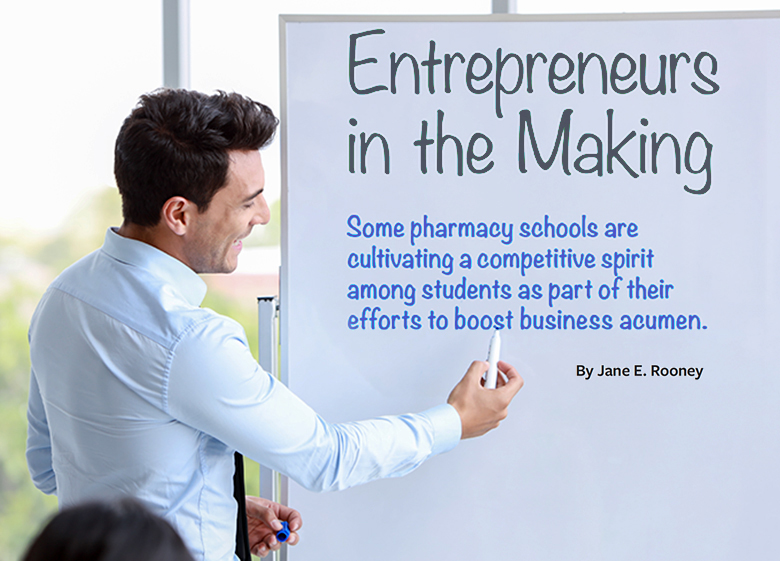
Pharmacy schools naturally want to foster innovation. Some schools are doing so by encouraging students to approach healthcare solutions from an entrepreneurial angle. While the connection between pharmacy and business may not be readily apparent, a growing number of pharmacy schools see the value in equipping student pharmacists with business skills so they can begin their careers with an entrepreneurial mindset and explore non-traditional job opportunities.
The University of Maryland School of Pharmacy has been ahead of the curve in this area, trademarking the term pharmapreneurship several years ago and weaving it into the curriculum. The school built on that momentum earlier this year with its inaugural competition for the Natalie D. Eddington Pharmapreneurship Award for Health Care Innovation, which allows Pharm.D. students to compete for the chance to turn their ideas into a business. The winning student received a $100,000 investment to launch her startup to help laboratory researchers dispose of or move unneeded laboratory equipment.
“Our curriculum provides an opportunity for students to learn more about how to take risks, how to develop ideas that they would like to bring to the market,” explained Dr. Magaly Rodriguez de Bittner, Felix Gyi Endowed Memorial Professor in Pharmapreneurship and associate dean for clinical services and practice transformation, University of Maryland School of Pharmacy. “We have established a pathway—a concentration for students interested in following that path—that provides them with certain courses and skill sets to develop that pharmapreneurship mindset. We’re giving them clinical knowledge through the curriculum, but today’s challenges in pharmacy require a new type of pharmacist who has the mindset of an entrepreneur: someone looking for solutions, being creative and setting their own goals.”
Other schools, including Drake University College of Pharmacy & Health Sciences and Oregon State University College of Pharmacy, offer similar pathways and competitions that allow students to consider pharmacy within an entrepreneurial framework and pursue creative avenues after graduation.
Igniting Ingenuity
The impetus to launch the competition, Rodriguez de Bittner said, began with the innovative concepts coming from students following the pharmapreneurship pathway. “We encountered so many great ideas the students had—we felt those ideas had value and we wanted a mechanism to finance those and provide startup funds so they could see the feasibility and launch these ideas to market,” she noted. In addition to the competition’s winning concept to increase sustainability in research laboratories, pitches from the finalists included developing a training program for patients to help them understand the history and benefits of cannabis-based and psychedelic-assisted therapies; establishing a network of medical cannabis professionals providing telehealth consulting services nationwide; and a mobile app aiming to improve medication adherence. Some teams—all led by Pharm.D. students—included students in engineering, computer science, medicine, law and some pursuing an M.S. in the Medical Cannabis Science and Therapeutics program. These interdisciplinary partnerships, she added, “allow them to expand their skill sets and determine how to negotiate with other members of the team. That brings a diverse approach and it opens their eyes to a whole set of skills that are valuable.”
Funded by an alumnus who wanted to support healthcare innovation, the competition stipulates that the winner gets financial support from the university in addition to other resources and legal services to create an LLC, but the school retains part ownership so that some of the income goes back to the program. “The competition makes it real for them that there are opportunities to creative paths,” Rodriguez de Bittner said. “One student told me, ‘This gave me the incentive and confidence to know that when I graduate, I have multiple avenues I can pursue.’ It doesn’t have to be traditional roles or a predetermined path. The students really welcome that opportunity and welcome the thought that they can shape their own career.”

The donor committed to funding the competition annually and the school is considering some tweaks, which may include financing for second and third place winners as well. Both the pathway and the competition “highlight that the school is the home of pharmapreneurship. We think this will change pharmacy practice,” Rodriguez de Bittner emphasized. “This was something that was needed in pharmacy education because as we see the challenges confronting the pharmacy profession and healthcare, we need to equip our students with this skill set. We feel we’re at the forefront and we are developing the pharmacists of the future. I was talking to a student who specifically told me the reason she came to Maryland is because of this pathway. Students really enjoy the ability to develop that creative side. It’s like fresh air. In the pharmacy program, you are so into science and the factual side of things, and having that opportunity to use the other side of your brain to come up with creative solutions to healthcare challenges is so exciting and unique. Our students love developing a pharmapreneurial mindset.”
Having that business know-how also prepares future pharmacists to provide better patient care. Some pharmapreneurship pathway students who pursued clinical roles have told Rodriguez de Bittner that they felt ready to face obstacles that might otherwise have intimidated them. “There are so many challenges for patients from acquiring needed medications to dealing with healthcare technology. Our students are saying that having a pharmapreneurial background made them better pharmacists because they can be problem solvers for the patients and are delivering better patient care,” she said. “Pharmapreneurship allows them to be a better resource for the patients, their employers and partnering with them to solve their challenges.”
Skills That Convey to Any Career
Drake University College of Pharmacy & Health Sciences is another trailblazer in the entrepreneurism arena. Almost 20 years ago the college made entrepreneurial leadership a pillar in its strategic plan. In the early 2000s a leadership team focused on embedding the concept in the curriculum and activities to raise visibility, which led to the creation of the DELTA (Drake Entrepreneurial Leadership Tools for Advancement) Rx Institute.
“The Institute’s mission is to instill a spirit of change and innovation in the pharmacy profession,” said Dr. Renae Chesnut, the college’s dean, who pointed out that Delta is the Greek symbol for change. “The website (www.drake.edu/deltarx) tries to highlight different innovations that have occurred within pharmacy, providing inspiration and information about the initiative. We feature articles about how to implement initiatives, profiles of entrepreneurial leaders, or blogs where someone who has implemented an initiative gives perspectives before, during and after the implementation of an innovation and their thought process, how they accommodated the challenges and lessons learned. Sometimes the blogs are an innovation described by three different people. For example, a faculty member started a new practice site and wrote an article, along with the first student who completed a rotation and one of the clinicians who benefited from the new service. The DELTA Rx website also shares available resources when considering an innovation.”

While the website is meant for the pharmacy community, the Institute offers summer internship opportunities specifically for Drake students, connecting them with partners that are mostly based in Iowa. “Students are interviewed and selected for either an independent community pharmacy or part of a franchise, and the student might spend more time in the home office or completely in practice settings,” Chesnut explained. “We have a curriculum that accompanies the internship—Shaping Your Pharmacy Future—which covers the various areas of leading an organization. Students don’t have to come back to Des Moines for programming as the materials are all online. Topics include management, marketing, strategic planning, accounting…almost like a mini-MBA. The students complete the modules, which serve as a starting point for conversations with their preceptor or other mentor at the site. They also complete a project and present a poster at our annual Health Professions Day, held on campus for all students.” The program, which has been running for 15 years, usually involves three to seven students each year.
The other unique opportunity available to Drake students is the institute’s Next Top Entrepreneur Competition, which takes place over three rounds to identify a winning solution to a healthcare problem. Students from all programs on campus can enter as individuals or teams. “The goal is to expose students to the development of skills that we may not be able to focus on in the curriculum to provide them with additional skills,” Chesnut said. Judges representing different sectors (e.g., business, healthcare and pharmacy) hear three-minute pitches from participants during round one and select 10 proposals to move on to round two. In that round, students have 60 minutes to develop a three-minute presentation offering a solution to a societal challenge such as drug abuse or a disease state management issue. Five are chosen to move on to round three, which requires a more detailed business plan presentation.


